Half of Real Estate Agents Say Junk in Neighbors’ Yards Decreases Your Property Value by 20% or More
Written by: StorageUnits.com Editorial Team - Published: April 21, 2025
The U.S. housing market is experiencing its highest level of new home inventory since the 2008 financial crisis, with 495,000 newly built homes available as of January 2025, representing a nine-month supply at the current sales pace. Despite this surge in supply, sales have declined by 10.5% from the previous month, largely due to high mortgage rates and affordability challenges deterring potential buyers. In this environment, sellers must take proactive steps to attract buyers, such as thoroughly cleaning and decluttering their homes to enhance appeal and perceived value. These cost-effective measures can make a significant difference in a market where buyers are cautious and selective.
StorageUnits.com surveyed nearly 500 licensed real estate agents to find out how much junk in or around a seller’s home, as well as neighborhood, impacts property value.
Our core insights:
- Nearly all real estate agents say junk or clutter in and around a seller’s home decreases property value
- Trash and excessive clutter are most likely to negatively impact property value
- 3 in 4 real estate agents say homes free of clutter sell at least 2x faster
6 in 10 Say Junk in Your Yard Decreases Property Value By 20% or More
Nearly half of real estate agents (47%) believe that junk or clutter in a seller’s yard significantly decreases property value, while 36% think it has a moderate impact. Further, 14% consider the effect slight, while 1% say there is no impact, and 1% are unsure.
When estimating the decrease in value, 19% of real estate agents believe it could reduce value by 20%, 18% estimate a 10% decrease, 10% think it would decrease by 5%, and 9% estimate a reduction between 25% and 30%. A smaller group (6%) believes the decrease could be as much as 40% to 50%, with 3% estimating a more than 75% reduction. Only 2% think the impact is minimal at 1% or less.
Half of real estate agents say junk in neighbors’ yards decreases property value by 20% or more
The majority of real estate agents believe that junk or clutter in neighbors’ yards significantly impacts a home’s property value, with 55% stating it has a significant effect. 33% believe it has a moderate impact, while 11% feel the impact is slight. A small percentage, 1%, believe it has no impact at all or are unsure of the impact.
Most real estate agents believe junk or clutter in a neighbor’s yard can decrease property value by 5% to 10% (32%). Additionally, 28% estimate a 15% to 25% decrease, 21% a 30% to 50% impact, and 8% believe there would be a more than 50% reduction in value.
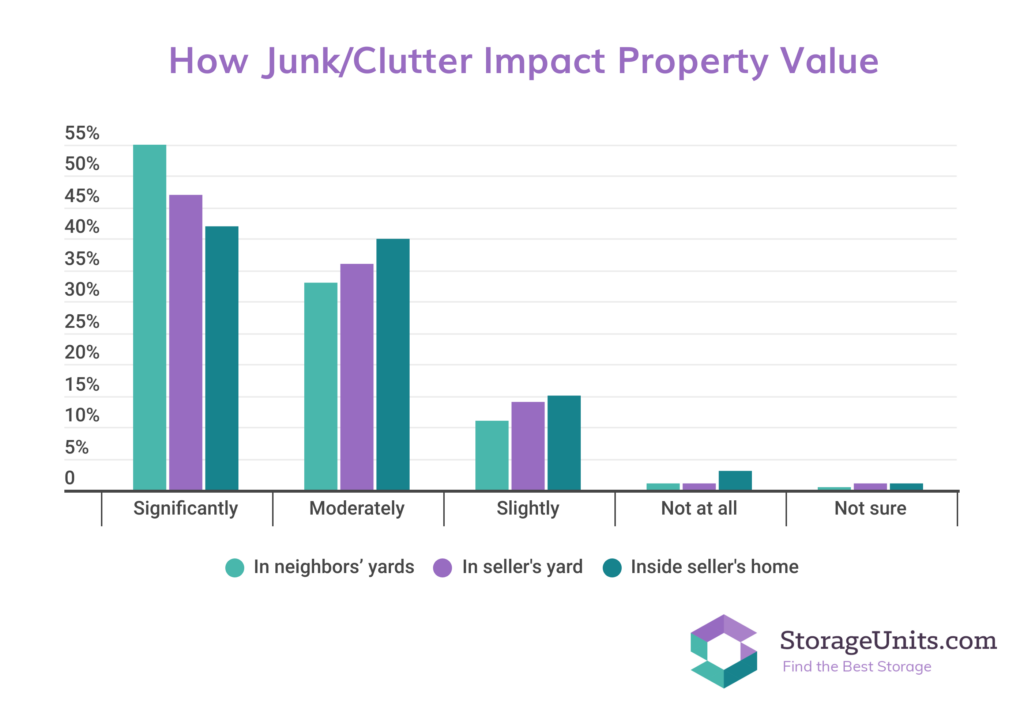
Trash and excessive clutter are most likely to negatively impact property value
The top items that real estate agents believe decrease property value the most in a seller’s yard are trash (81%), excessive clutter (78%), yard waste (67%), old cars (51%), building materials like pieces of wood (48%), and indoor furniture (40%).
Similarly, the top items, if in neighbors’ yards, that are believed to decrease property value the most are trash (85%), excessive clutter (82%), yard waste (69%), old cars (57%), building materials like pieces of wood (52%), and too many cars (42%). These items are considered the most detrimental when present in a neighbor’s yard.
RVs, boats, and cars outside a garage can hurt property value
Some items, which may even be luxury items, such as RVs and boats, can damage property value if improperly stored on a seller’s or neighbor’s property.
Regarding storing larger items like boats and RVs, 34% of real estate agents would “definitely” recommend storing them in an off-property storage unit, while 42% would “probably” recommend this approach.
More than half (51%) of real estate agents say that improperly stored old cars in a seller’s yard can harm property value, 36% say too many cars can, 10% say RVs can, 10% say boats can, and 7% say cars stored in the driveway instead of the garage can. Similarly, many real estate agents believe that if these items are improperly stored in a neighbor’s yard, they can still negatively impact the seller’s property value.
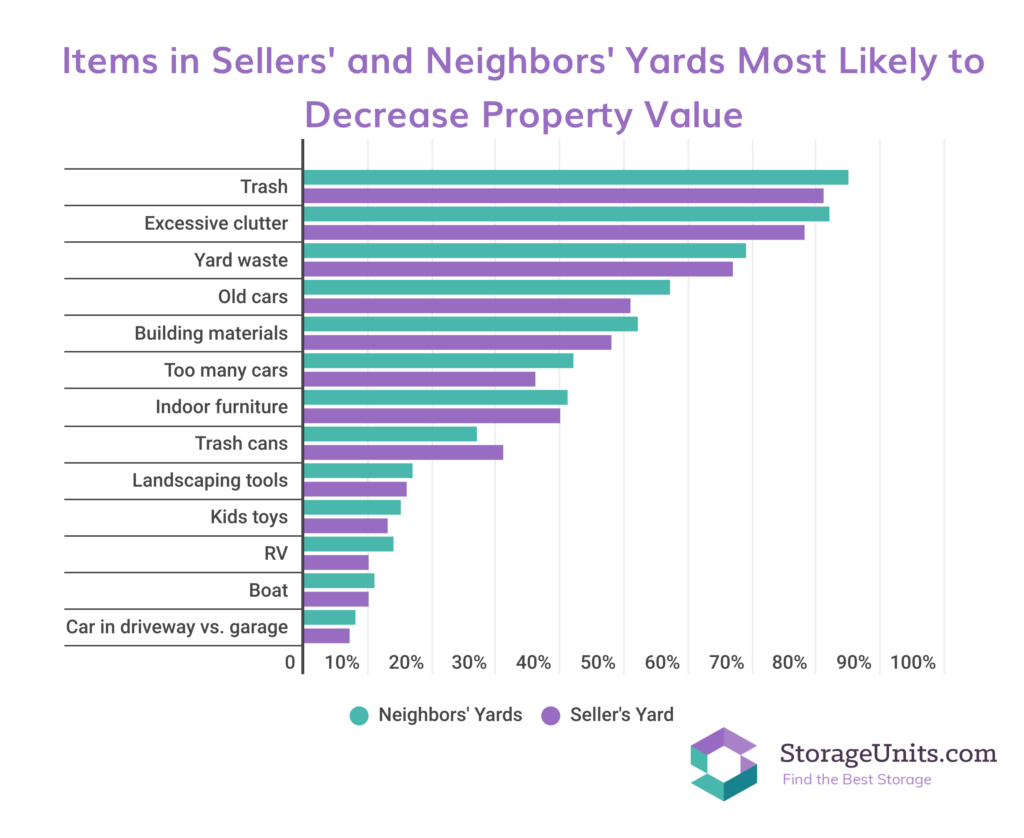
“As a real estate broker for over 25 years, I’ve seen how clutter and an unkempt property can reduce a home’s value,” says Scott Beloian, broker/owner of Westcoe.
“Excessive clutter inside can decrease a home’s value by 10% or more as buyers struggle to see past the mess. Buyers assume significant repairs are needed and that the sellers did not properly maintain the home. I always recommend decluttering and staging a home before listing it for sale.
Outside, yards filled with trash, junk cars, and overgrown landscaping are instant turn-offs for buyers. They’ll question the condition of the inside and the neighborhood. Messy neighboring yards can cut a home’s value by 5% or more, especially if in sight of the property. No one wants messy neighbors or safety issues.
“The most valuable thing a seller can do is declutter and clean their property, inside and out. It allows buyers to see the home’s potential and often means a faster sale at a higher price. I encourage sellers to get neighbors to do the same, as it benefits the whole community.”
Nearly All Real Estate Agents Say Clutter Inside Home Impacts Sale Price
When it comes to the impact of junk or clutter inside a seller’s home on property value, the majority of real estate agents perceive it as having a negative effect; 42% believe that clutter significantly decreases the value of a property, while another 40% feel it has a moderate impact. This indicates that nearly all real estate agents see some level of negative effect, with only 15% considering the impact slight and a mere 3% being unsure or believing it has no impact at all.
When estimating the specific decrease in property value due to clutter inside the home, 18% believe that clutter can reduce the value by around 10%, followed by 13% estimating a 15% reduction, and 16% estimating a 20% decrease. Additionally, 10% think the impact could be around 30%, 6% believe the decrease could be as significant as 50%, and 4% report the possibility of a 75% or greater decrease.
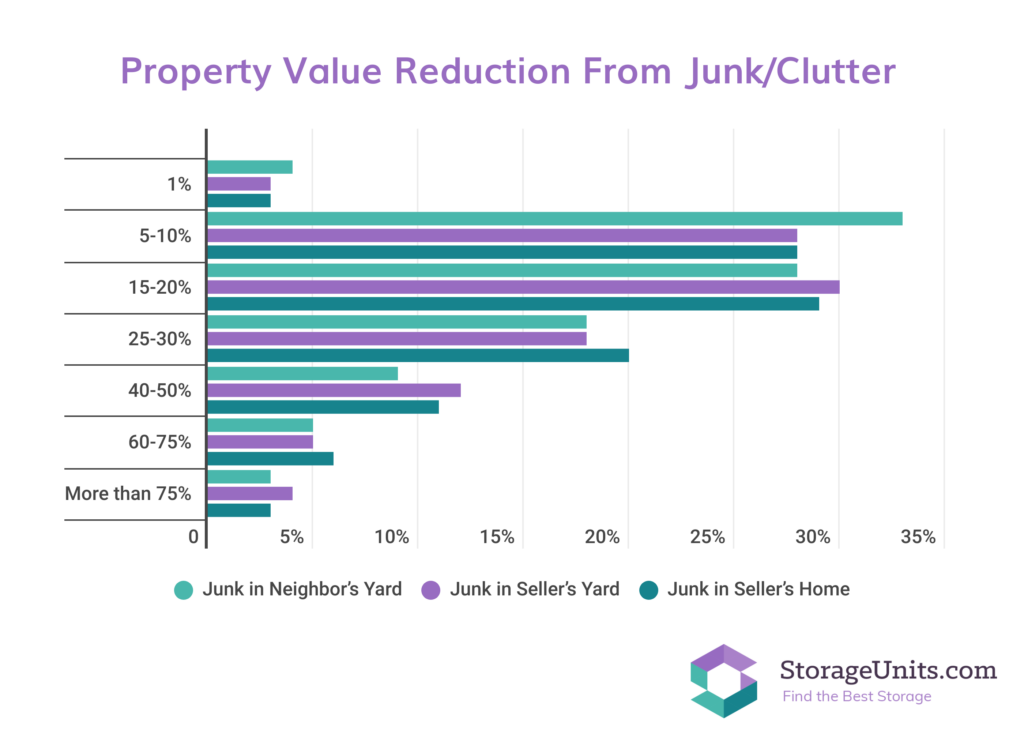
Notably, the kitchen is seen as the most crucial area to keep clutter-free, with 83% of real estate agents identifying it as having the most significant negative impact, followed by the living room at 73% and the bedrooms at 60%.
Clutter-Free Homes Sell At Least 2x Faster
When asked about the impact of a clutter-free home on the speed of sale, 19% estimate a sale speed of 1.5 times faster for a clutter-free home, 40% of real estate agents believe that a clutter-free home will sell twice as fast as a cluttered one, and 36% think it will sell more than twice as fast. Only 2% believe there would be no difference in the selling speed, and 3% are unsure.
“A messy yard can really turn off buyers. Mess like overgrown weeds, trash, or old cars. That stuff can make your house look neglected and drop its value by a lot — like 5% to 20%,” says President and CEO of Prestige Home Buyers Warner Quiroga.
“Inside, it’s even worse. A cluttered house feels cramped and disorganized. It’s like trying to find a needle in a haystack. This can slash your home’s value by up to 30%. Even a messy neighbor’s yard can hurt your property’s value. It makes the whole neighborhood look bad.
“If you want your house to sell fast and for a good price, then declutter. It’s like giving your home a makeover. Consider renting a storage unit to hide away stuff you don’t need. Start early, be strict with decluttering, and don’t hesitate to ask for help. You might even want to hire a professional organizer. A clean and tidy home is worth it.”
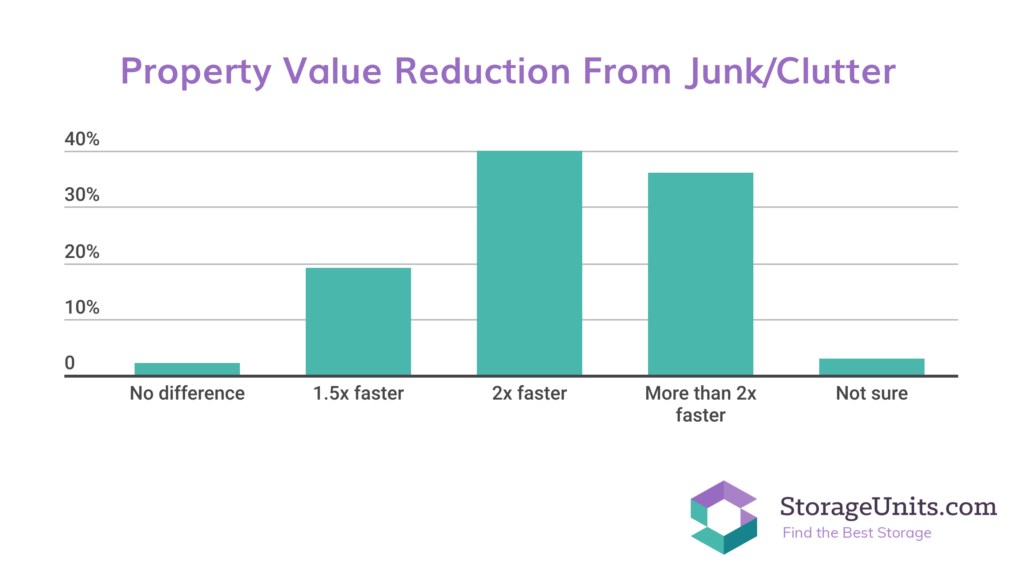
Two-Thirds Suggest Renting a Storage Unit to Declutter Before Listing Home for Sale
The most effective strategies recommended by real estate agents for decluttering a home before listing it for sale include donating unused items (81%), renting a storage unit (67%), and holding a garage sale (58%). Other effective strategies that are also commonly advised to clients preparing their homes for sale include using temporary portable storage containers (48%) and hiring a professional organizer (46%).
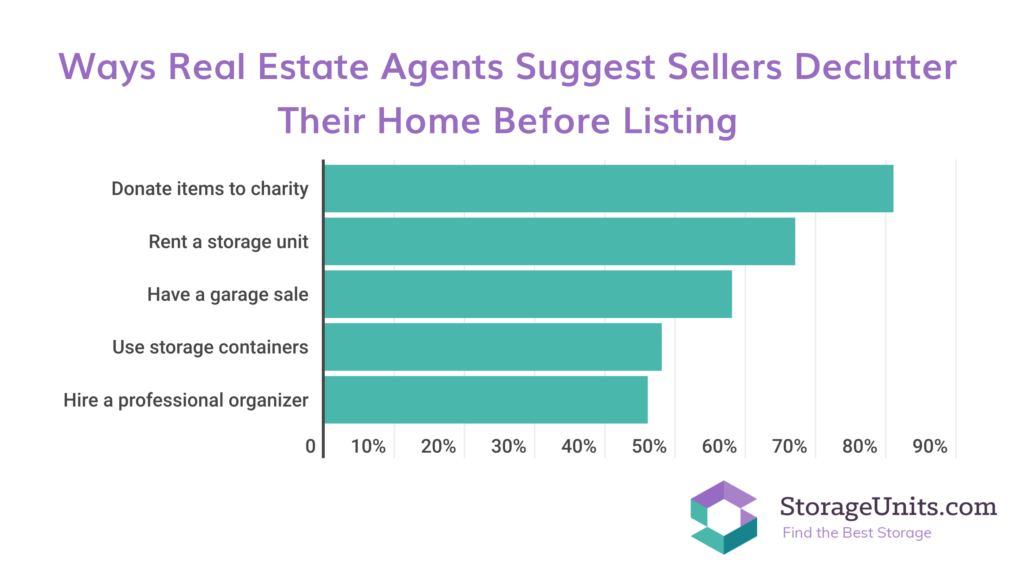
Regarding storing larger items like boats and RVs, 34% of real estate agents would “definitely” recommend storing them in an off-property storage unit, while 42% would “probably” recommend this approach.
Methodology: This report is based on data from a survey commissioned by StorageUnits.com and conducted online via Pollfish. The survey included 484 U.S. real estate agents. The survey commenced on August 1, 2024. Demographic criteria and screening issues were used to ensure appropriate respondents were selected.